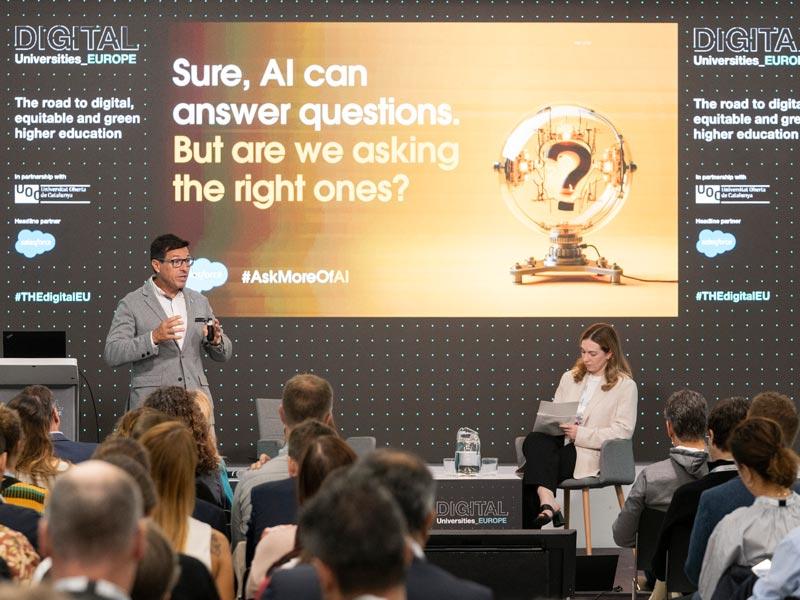Artificial intelligence (AI) has divided the higher education sector into enthusiasts and sceptics. Despite the differing attitudes, higher education institutions are exploring ways to harness the potential of AI to automate operations and improve efficiency. During a session at the 2023 THE Digital Universities Europe event, held in partnership with Salesforce, Julio Villalobos, the company’s education strategic industry advisor, shared insights on how higher education institutions can utilise the full potential of AI.
AI presents an incredible opportunity for institutions to innovate, become more future-ready, personalise the student experience and improve efficiency. “AI is not just about technology,” said Villalobos. AI is a revolution in customer management, the responsible use of data and student engagement.
The biggest challenge higher education institutions face in taking advantage of generative AI is knowing where to start and defining a strategy. Villalobos said that a 2023 McKinsey report on the economic potential of generative AI placed higher education among the top five industries likely to benefit the most from generative AI. “Education institutions embracing AI have a tremendous opportunity to drive new levels of innovation and really change things,” he said.
Although the higher education sector can be slow-moving, AI can make a difference, said Villalobos. It can assist institutions in transforming and improving the student life cycle – from recruitment to alumni engagement – across domains such as operations, marketing and information technology. AI can help universities scale their marketing and communication efforts without the need for additional resources. AI can improve aspects of information management such as data integration, data quality and data security, he added.
However, Villalobos foresees challenges in implementing AI in education: “There are many different obstacles and we need to be conscious of them.” Villalobos shared a framework that higher education institutions can use to adopt AI effectively. This includes identifying repetitive tasks that could be automated, recognising stakeholders that need support, determining key performance indicators and mapping the data that feeds into AI systems. Villalobos’ advice to institutions is to start small: “Don’t go big. Identify a priority use case, do small iterations and then scale.”
AI should be accessible to everyone, said Villalobos. However, it is not enough to deliver only the technological capabilities of AI. Those who use it have an important responsibility to ensure that AI is safe and inclusive, and should have a set of principles regarding AI, he added. In 2018, Salesforce began articulating its trusted AI principles – such as responsibility, accountability, transparency, empowerment and inclusivity – to develop and use AI safely, accurately and ethically.
“Our guiding purpose at Salesforce for Education is to help every education institution improve outcomes for their students,” said Villalobos. “But we know that harmonising and securing data are top priorities and we are committed to supporting and making these efforts easier for institutions.”
Salesforce helps institutions by delivering a platform for trusted AI. “AI is integrated into all of our applications, including Education Cloud.” Education Cloud provides institutions with a set of tools to manage the whole student journey. A good number of Salesforce customers already use its AI capabilities to predict and understand the needs of students throughout their academic journey. This allows them to save valuable time to engage with students in a hyper-personalised way, concluded Villalobos.
The panel:
- Charlotte Coles, director of global events, Times Higher Education (chair)
- Julio Villalobos, education strategic industry advisor, Salesforce
Find out more about Salesforce.


comment